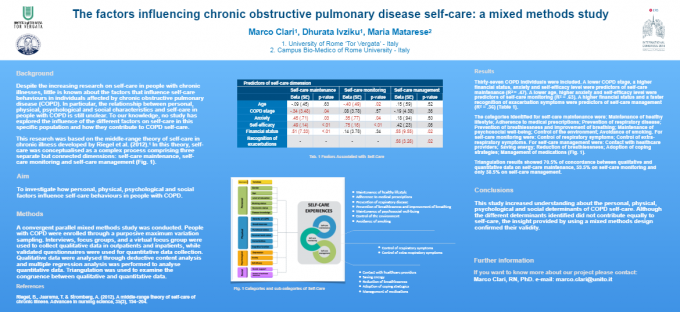The factors influencing chronic obstructive pulmonary disease self-care: a mixed methods study
Autori
Abstract
Introduction
The literature has identified several factors that can influence COPD self-care. Despite this, the influence of these factors and how they contribute to COPD self-care is still unclear.
Aim
To investigate how personal, physical, psychological and social factors influence COPD self-care.
Methods
A convergent parallel mixed methods study was conducted. Patients were enrolled through a purposive maximum variation sampling. Interviews, focus groups, and a virtual focus group were used to collect qualitative data; while validated questionnaires were used for quantitative data collection. Texts were analysed through content analysis. Multiple regression analyses were performed. Triangulation was used to examine congruence of qualitative and quantitative data.
Results
Thirty-seven individuals were included. A lower COPD stage, a higher financial status and anxiety and self-efficacy level were predictors of self-care maintenance. A lower age, higher anxiety and self-efficacy level were predictors of self-care monitoring. A higher financial status and a faster recognition of exacerbation symptoms were predictors of self-care management. Categories and subcategories were identified from the qualitative data analysis. Triangulation showed a 70.5% of concordance between qualitative and quantitative data on self-care maintenance, 59.5% on self-care monitoring and only 38.5% on self-care management.
Conclusions
This study increased understanding about the personal, physical, psychological and social determinants of COPD self-care. Although the different determinants identified did not contribute equally to self-care, the insight provided by using a mixed methods design confirmed their validity.



